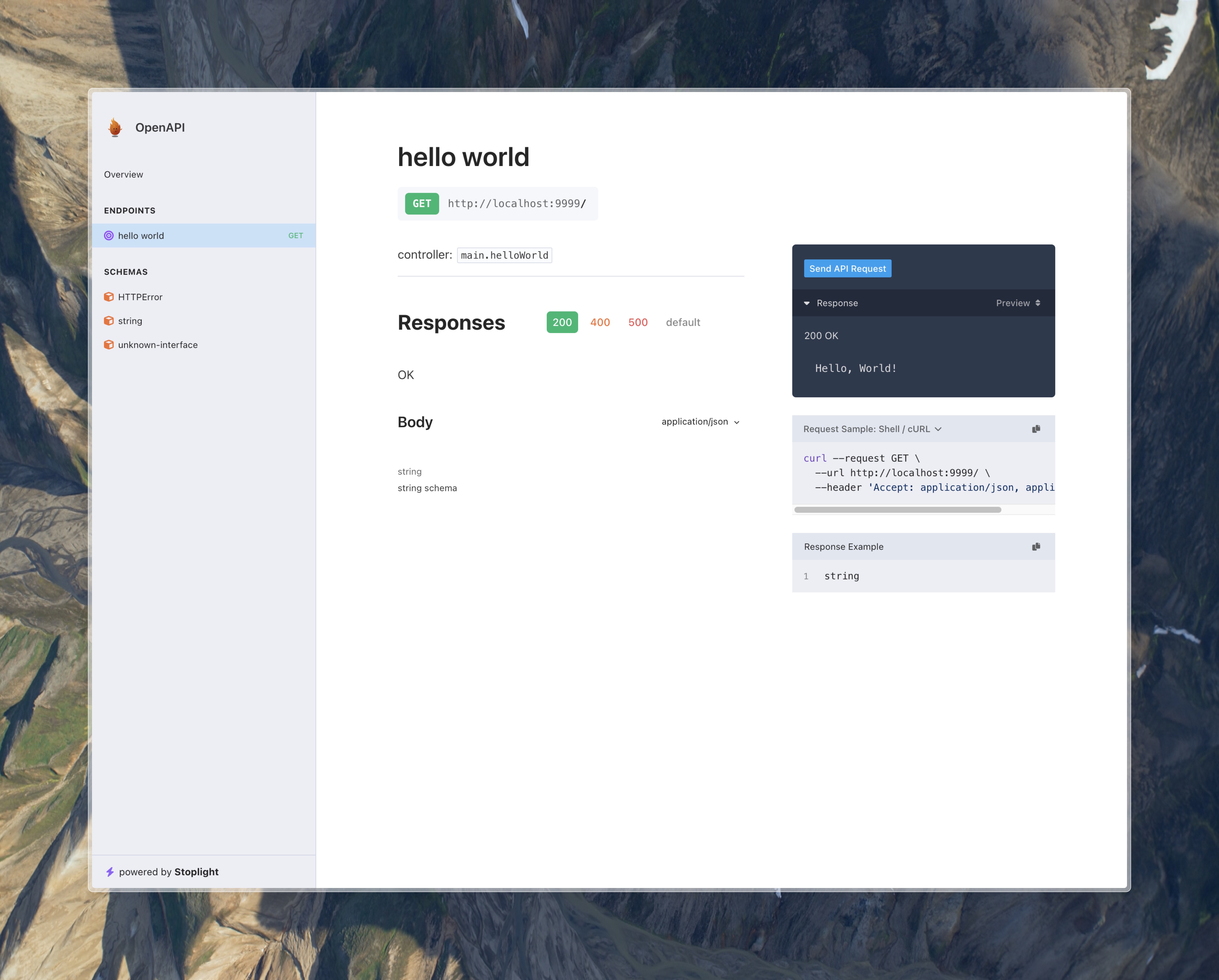OpenAPI Specification
Fuego automatically generates an OpenAPI specification for your API.
package main
import (
"github.com/go-fuego/fuego"
)
func main() {
s := fuego.NewServer()
fuego.Get(s, "/", helloWorld)
s.Run()
}
func helloWorld(c fuego.ContextNoBody) (string, error) {
return "Hello, World!", nil
}
Result for this simple example at http://localhost:9999/swagger/index.html:

The core idea of Fuego is to generate the OpenAPI specification automatically, so you don't have to worry about it. However, you can customize it if you want.
Route Options
Each route can be customized to add more information to the OpenAPI specification.
Just add methods after the route declaration.
package main
import (
"github.com/go-fuego/fuego"
"github.com/go-fuego/fuego/option"
"github.com/go-fuego/fuego/param"
)
func main() {
s := fuego.NewServer()
fuego.Get(s, "/", helloWorld,
option.Summary("A simple hello world"),
option.Description("This is a simple hello world example"),
option.Query("name", "Name to greet", param.Required(), param.Default("World")),
option.Tags("Hello"),
option.Deprecated(),
)
s.Run()
}
func helloWorld(c fuego.ContextNoBody) (string, error) {
return "Hello, World!", nil
}
Group Options, Options Groups & Custom Options
You can also customize the OpenAPI specification for a group of routes.
package main
import (
"github.com/go-fuego/fuego"
"github.com/go-fuego/fuego/option"
)
// Define a reusable group of options
var optionPagination = option.Group(
option.QueryInt("page", "Page number", param.Default(1)),
option.QueryInt("limit", "Items per page", param.Default(10)),
)
// Custom options for the group
var customOption = func(r *fuego.BaseRoute) {
r.XXX = YYY // Direct access to the route struct to inject custom behavior
}
func main() {
s := fuego.NewServer()
api := fuego.Group(s, "/users",
option.Summary("Users routes"),
option.Description("Default description for all Users routes"),
option.Tags("users"),
)
fuego.Get(api, "/", helloWorld,
optionPagination,
customOption,
option.Summary("A simple hello world"), // Replace the default summary
)
s.Run()
}
func helloWorld(c fuego.ContextNoBody) (string, error) {
return "Hello, World!", nil
}
Output
Fuego automatically provides an OpenAPI specification for your API in several ways:
- JSON file
- Swagger UI
- JSON endpoint
Fuego will indicate in a log the paths where the OpenAPI specifications and Swagger UI are available.
You can customize the paths and to activate or not the feature, with the option WithOpenAPIConfig.
package main
import (
"github.com/go-fuego/fuego"
)
func main() {
s := fuego.NewServer(fuego.WithOpenAPIConfig(fuego.OpenAPIConfig{
DisableSwagger: false, // If true, the server will not serve the swagger ui nor the openapi json spec
DisableLocalSave: false, // If true, the server will not save the openapi json spec locally
SwaggerUrl: "/swagger", // URL to serve the swagger ui
JsonUrl: "/swagger/openapi.json", // URL to serve the openapi json spec
JsonFilePath: "doc/openapi.json", // Local path to save the openapi json spec
UIHandler: DefaultOpenAPIHandler, // Custom UI handler
}))
fuego.Get(s, "/", func(c fuego.ContextNoBody) (string, error) {
return "Hello, World!", nil
})
s.Run()
}
Custom UI
Fuego Server exposes a UIHandler field that enables you
to implement your custom UI.
Example with http-swagger:
import (
"net/http"
"github.com/go-fuego/fuego"
httpSwagger "github.com/swaggo/http-swagger"
)
func openApiHandler(specURL string) http.Handler {
return httpSwagger.Handler(
httpSwagger.Layout(httpSwagger.BaseLayout),
httpSwagger.PersistAuthorization(true),
httpSwagger.URL(specURL), // The url pointing to API definition
)
}
func main() {
s := fuego.NewServer(
fuego.WithOpenAPIConfig(fuego.OpenAPIConfig{
UIHandler: openApiHandler("/swagger.json"),
}),
)
fuego.Get(s, "/", helloWorld)
s.Run()
}
The default spec URL reference Element Stoplight Swagger UI.
Please note that if you embed swagger UI in your build it will increase its size by more than 10Mb.
| StopLight Elements | Swagger | Disabled | |
|---|---|---|---|
| Works offline | No ❌ | Yes ✅ | - |
| Binary Size | Smaller | Larger (+10Mb) | Smallest |
Get OpenAPI Spec at build time
With Go, you cannot generate things at build time, but you can separate the
OpenAPI generation from the server, by using the
(Server).OutputOpenAPISpec() function.
package main
import (
"github.com/go-fuego/fuego"
)
func main() {
s := fuego.NewServer()
fuego.Get(s, "/", helloWorld)
if justGenerateOpenAPI { // A CLI flag, an env variable, etc.
s.OutputOpenAPISpec()
return
}
s.Run()
}
Hide From OpenAPI Spec
Certain routes such as web routes you may not want to be part of the OpenAPI spec.
You can prevent them from being added with the server.Hide().
package main
import (
"github.com/go-fuego/fuego"
)
func main() {
s := fuego.NewServer()
// Create a group of routes to be hidden
web := s.Group(s, "/")
web.Hide()
fuego.Get(web, "/", func(c fuego.ContextNoBody) (string, error) {
return "Hello, World!", nil
})
// These routes will still be added to the spec
api := s.Group(s, "/api")
fuego.Get(api, "/hello", func(c fuego.ContextNoBody) (string, error) {
return "Hello, World!", nil
})
s.Run()
}